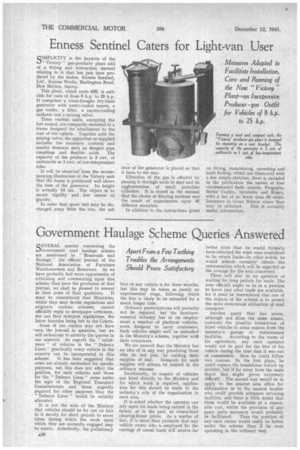Government Haulage Scheme Queries Answered
Page 28

If you've noticed an error in this article please click here to report it so we can fix it.
Apart From a Few Teething Troubles the Arrangements Should Prove Satisfactory
SEVERAL queries concerning the Government road haulage scheme are mentioned in "Removals and Storage," the official journal of the National Association of Furniture Warehousemen and Removers. As we have probably had more opportunity of criticizing and commenting upon this scheme than have the producers of that journal, we shall be pleased to answer
at least some of their questions. It must be remembered that Ministries, whilst they may devise regulations and originate various schemes, cannot officially reply to newspaper criticisms, nor can they interpret regulations, the latter function being left to the Courts.
Some of our readers may not have -seen the journal in question, but we will endeavour to embody the queries in our answers. As regards the " enlistment " of vehicles in the " Defence Lines," practically every vehicle in the country can be incorporated in this scheme. It has been suggested that some are already earmarked for specific purposes, but this does not affect the position, for such vehicles and those for the " Defence Lines " come under the gri_s of the Regional Transport Commissioners and those urgently required for other purposes than the " Defence Lines" would be suitably allocated.
It is not the wish of the Ministry that vehicles should be let out on hire to it merely for short periods to cover times during which the work upon which they are normally engaged may • be scarce. Admittedly, the preliminary hire of any vehicle is for three months, but this may be taken as purely an experimenter stage, following which the hire is likely to be extended for a much longer tithe.
Ordinary pantechnicons will probably not be required, but the furnitureremoval industry has in its employment a number of platform vehicles, some designed to carry containers. Such vehicles might well be embodied in the Ministry's scheme, together with their containers.
We are assured that the Ministry has no idea of in any way penalizing those who do not join, by cutting their
supplies of fuel. Demands for such supplies will always be treated in the• ordinary manner.
Incidentally, in respect of vehicles not hired directly to the Ministry and for which work is required, application for this should be made to the industry's side of the organization in each area.
It is asked whether the operator can rely upon his loads being carried in the future, as in the past, at return-load clearing-house prices, As a matter of fact, it is more than probable that any vehicle owner who is employed for the carriage of casual loads will receive far better rates than he would formerly have obtained for what were considered to be return loads—in other words, he would almost certainly obtain the remuneration which will be regarded as the average for the area concerned.
There will also be no question of waiting for long periods for loads. The area officials ought to be in a position to know just what loads are available, for it must be remembered that one of the objects of the schenle is to permit the more economical utilization of road transport.
Another query that has arisen, although not from the same source, concerns the possible breakdown of hired vehicles in areas remote from the operator's garage or maintenance
facilities. According to the terms of his agreement, any such opefator would not be paid for the hire of his vehicle during the time that it was out of commission, Here he could follow two courses. In the first place, he could replace the breakdownvehicle by another, but if far away from the main depot this might prove extremely difficult. The second way wouldbe to apply to the nearest area office for information as to the nearest haulier who could provide adequate servicing facilities, and there is little doubt that these would be available at a reasonable cost, whilst the provision of any spare parts necessary would probably
be facilitated. Thus the position of any such owner would really be better under the scheme than if he were operating in the ordinary way.




















































